| Sesame Street | |||||||||||
| The adults explain Mr. Hooper's death to Big Bird | |||||||||||
| Air date | November 24, 1983 (Thanksgiving) | ||||||||||
| Season | Season 15 (1983-1984) | ||||||||||
| Written by | Norman Stiles | ||||||||||
| |||||||||||

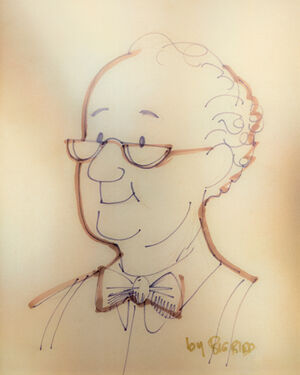
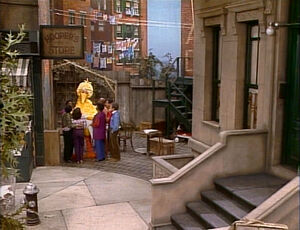
Background
When actor Will Lee died in 1982, it left the producers of Sesame Street with the question of how to deal with the loss of Mr. Hooper, a beloved character who had been on the show since the first episode. Dulcy Singer, executive producer at the time, said that "if we left it unsaid, kids would notice."[1] One way out was to avoid the issue of death entirely. Producers toyed with the idea of telling viewers that the character had gone away. Caroll Spinney said that "we didn't know what to do. [We] thought perhaps he could just retire, move to Florida or something, but then the producers thought that the best thing to do would be to actually deal with death."[2] After much discussion and research, the producers decided to have the character of Mr. Hooper pass away as well, and use the episode to teach its young viewers about death as a natural part of life and that it is okay to grieve and feel sad when a loved one passes away.
After consulting with numerous child psychologists, Norman Stiles, the head writer for the show, prepared a script designed to deal with the issue of death on Sesame Street. The cause of death was not discussed on the show, nor is the process of growing old. Valeria Lovelace, director of research at the show's production company, the Children's Television Workshop, said "We were advised to take the direct approach... Children don't understand words like 'passing away.'"[1] The show took an honest and direct approach. Show producer Fran Kaufman said that the goal was to avoid "sugar-frosting" the message.
That message, according to the producers, was "[Mr. Hooper] died, he won't be coming back, and we are all going to miss him...Another message of the segment was that children have to understand that they will continue to be cared for."[1]
In the episode, Big Bird thinks that Mr. Hooper will return later, but is told about the irreversibility of death. Although he has already been told Mr. Hooper has died, Big Bird (like many children) shows his initial inability to comprehend this concept. But Big Bird's concern soon switches to his own needs. He wonders, "Who's going to take care of the store? Who's gonna make me birdseed milkshakes and tell me stories?" The other adults reassure him that everything will be okay, but Big Bird says it won't be the same. Bob addresses Big Bird's concern head-on, saying, "You're right, Big Bird. It'll never be the same without him. But you know something? We can all be very happy that we had a chance to be with him and to know him and to love him a lot, when he was here." Big Bird still expresses sadness and frustration, demanding why it has to be this way. After a pause, and in a callback to a previous scene, Gordon answers that it has to be this way, "just because." Big Bird thinks it over and then contemplates his drawing of Mr. Hooper, saying, "You know, I'm gonna miss you, Mr. Looper." Maria replies, laughing through tears, "That's Hooper, Big Bird, Hooper." The adults gather around Big Bird for an embrace.
The farewell episode aired November 24, 1983 (Thanksgiving Day). Loretta Long noted, in an interview on The Tavis Smiley Show, "We were very careful to do it over the Thanksgiving holiday, where there would be a lot of adults in the house to help the children."[3]
The filming of the scene was very emotional for the cast and crew, whom had worked closely with Will Lee for 14 years. Genuine tears were present in almost all on set. "We barely got through that show," said Bob McGrath in a 2006 interview. "Any emotions you saw were real. We tried to do a pickup and we got about a minute into it and we all fell apart emotionally. It crossed over not only from PBS, but all of the networks. They all felt it was such an important show that they took the time to highlight it."[4]
Mr. Hooper's death received a lot of press and drew many viewers. Reports stated that the episode was used to stimulate discussion of death in many homes. Valeria Lovelace commented, "It was a relief to us all that the segment worked as we hoped it would. It was really scary beforehand; we didn't know for sure how it was going to turn out."[5] The episode was soon selected by the Daytime Emmys as being one of the 10 most influential moments in daytime television.
Aside from receiving critical acclaim, the episode garnered success with its _target viewers. Loretta Long explained, "People come up to us and say, 'Thank you. Now we can explain what happened to grandma, what happened to grandpa.'"[3]
The episode was later adapted into the book, "I'll Miss You, Mr. Hooper" by episode writer Norman Stiles. The full, uncut version of this episode is available for viewing as part of the collection at The Museum of Television and Radio. The scene with the adults explaining Mr. Hooper's death has appeared in script form in Sesame Street Unpaved, while portions of the scene have appeared in Sesame Street: 20 and Still Counting, Stars and Street Forever, Sesame Street Unpaved, A&E Biography: Sesame Street, and The Street We Live On. Select scenes from the episode have appeared on the videos 40 Years of Sunny Days, Old School: Volume 3, and 50 Years and Counting.
The best episode we ever did was Mr. Hooper's death.
Those were real tears. Will was the sweetest man.Caroll Spinney[6]
Segments

| Picture | Segment | Description |
|---|---|---|
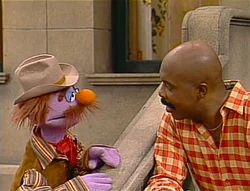 |
SCENE 1 | Gordon comes across a very happy Forgetful Jones, who can't remember why he's so happy. Gordon helps him remember that it was because of the sunshine, the breeze, the swaying trees and the sound of his heartbeat, all in time with each other. Forgetful observes, "Can you imagine me forgetting simple things that make me happy?" |
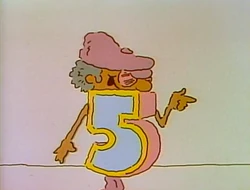 |
Cartoon | Jive Five (First: Episode 1664) |
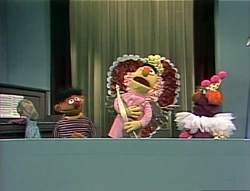 |
Muppets | Prairie Dawn presents a pageant about feelings. Bert dresses as Cupid to represent love, but his lines don't ring true. Instead, he sings his own song — "That's Love" — expressing that, to him, love means pigeons, oatmeal... and Ernie. (First: Episode 1731) |
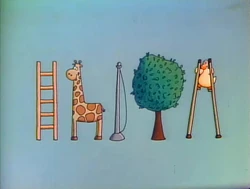 |
Cartoon | A delivery person delivers five tall things. (First: Episode 1664) |
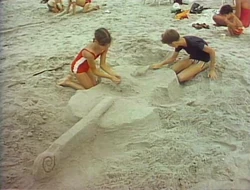 |
Film | Kids talk about building sand castles and sand structures at the beach. (First: Episode 1122) |
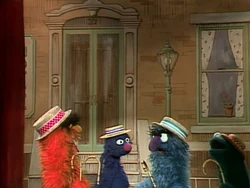 |
Muppets | Grover, Herry, Cookie Monster and Frazzle sing "Fuzzy and Blue (and Orange)." (First: Episode 1644) |
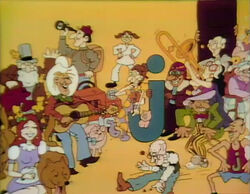 |
Cartoon | J family jamboree (First: Episode 0365) |
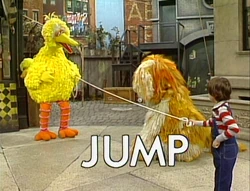 |
SCENE 2 | Big Bird and Jason demonstrate the letter J in the word "jump" by urging Barkley to jump over their rope, but Barkley isn't interested. Jason gives Barkley his end of the rope (tying it to his collar) to jump over it himself, but this time when Barkley hears the command to jump, he jumps onto Big Bird instead. cut from the Noggin version |
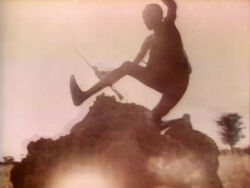 |
Film | People jump. (First: Episode 0774) |
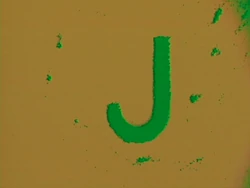 |
Animation | Sand J/j (First: Episode 0631) |
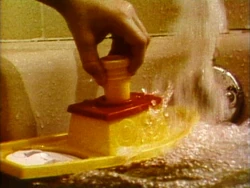 |
Film | As a boy plays with a tugboat in the bathtub, we watch footage of a real tugboat. (First: Episode 0801) |
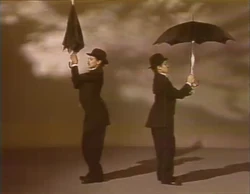 |
Insert | The two Chaplins open umbrellas. (First: Episode 1174) |
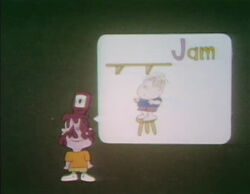 |
Cartoon | J - Jam (First: Episode 0012) |
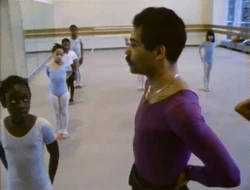 |
Film | A boy takes dance lessons at The Alvin Ailey American Dance Theater. (First: Episode 1716) |
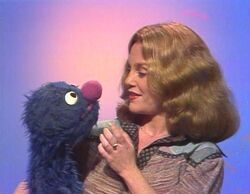 |
Muppets | "Sing After Me" by Grover and Madeline Kahn (First: Episode 1112) |
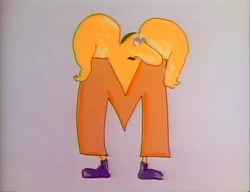 |
Cartoon | Don't mess with the Mighty M. Artist: Bruce Cayard (First: Episode 1578) |
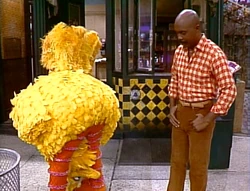 |
SCENE 3 | Gordon watches Big Bird walking backwards with his head between his legs. When pressed for an explanation as to why he's doing it, Big Bird simply says "just because," and can't come up with a better answer. He then moves on to side-stepping and going "dee-doo, dee-doo" and Gordon, just because, does it as well. |
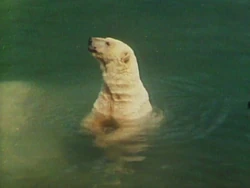 |
Film | A zookeeper feeds some polar bears sardines. (First: Episode 1647) |
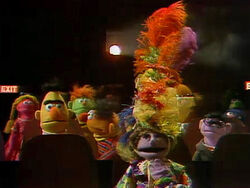 |
Muppets | At the movies, a lady with a tall hat sits in front of Ernie and Bert. She block's Ernie's view, so he asks her if she'd mind taking it off. When she places the hat on the seat next to her, Bert's view is now obstructed. (First: Episode 0538) |
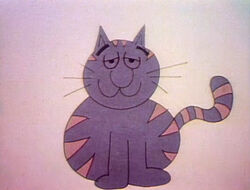 |
Cartoon | In rhyme, a man points out animals who stole and/or ruined his clothing. (First: Episode 0778) |
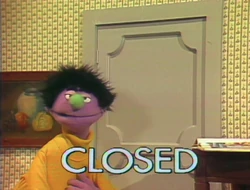 |
Muppets | A Large Lavender Live Hand Anything Muppet closes everything. (First: Episode 1270) |
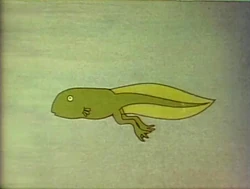 |
Cartoon | How do frogs make more frogs? The birth and growth of a frog is documented. At the very end, the fully-grown frog hops in the middle of a field and calls out, "Hey, Kermit!" Artist: Cathryn Aison (First: Episode 1232) cut from the Noggin version |
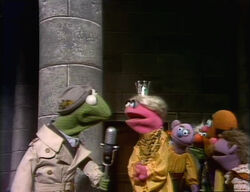 |
Muppets | Sesame Street News Flash: Princess Chooses a Prince — A princess selects Kermit as her prince. (First: Episode 0859) |
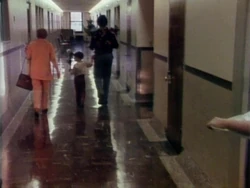 |
Film | A boy visits the hospital to see his mother's new baby. (First: Episode 1125) |
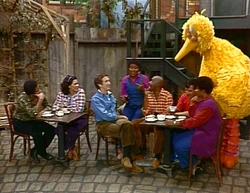 |
SCENE 4 | Big Bird finds all his grown-up friends (David, Maria, Bob, Olivia, Gordon, Luis, and Susan) in the yard having a conversation. He joins the group and decides to make their discussion "more exciting" by turning it into a game. He listens and tries to figure out what they're talking about while balancing on one leg the whole time, and concludes they're conversing about Mr. and Mrs. Williams arriving today with their new baby. When the topic changes from newborns to politics, Big Bird gives up - nothing can make that interesting! |
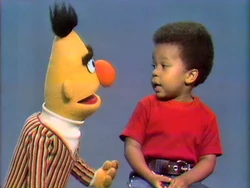 |
Muppets | Muppet & Kid Moment — Bert tells John-John that he's lost his paper clips, and he feels sad. He asks John-John to show how he looks when he feels sad. Then Bert feels angry about losing his paper clips, and John-John acts out that emotion. Bert remembers where he left his collection, and John-John acts happy, too. (First: Episode 0443) cut from the Max version |
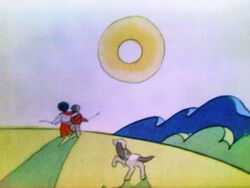 |
Cartoon | "That's About the Size of It" Artist: Bud Luckey (First: Episode 0279) cut from the Noggin version |
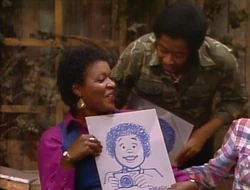 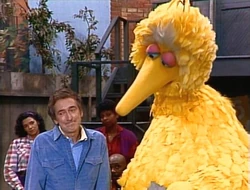 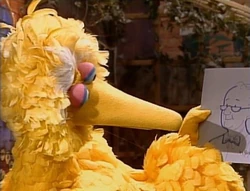 |
SCENE 5 | As the group continues discussing potential candidates for the upcoming election, Big Bird gives his friends the pictures he drew of them from memory. He reveals his picture of Mr. Hooper last, and is eager to give it to the jovial storekeeper. Maria reminds him that Mr. Hooper is no longer present as he had died, while Susan and Luis explain what this means. Big Bird processes what has happened, and is reassured by the others that they will be there to help take care of him - David will now run Hooper's Store and make him milkshakes and tell him stories like Mr. Hooper used to. Big Bird begins to cry, unhappy with what is going on and demands to know a good reason why it has to be this way. Recalling what they discussed earlier, Gordon explains that it has to be this way "just because," as there doesn't seem to be a better way to explain it. Big Bird softly tells his picture, "You know, I'm gonna miss you, Mr. Looper." Maria chuckles through tears at Big Bird's misnomer, and the others gather around him for comfort. |
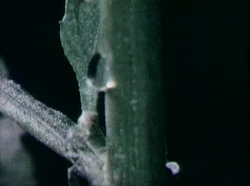 |
Film | A film shows parts of a flower. Music: Vivaldi's Concerto for lute, 2 violins and continuo in D Major II - Largo (First: Episode 0008) |
 |
Cartoon | A man learns that it's better not to pick the flowers. (First: Episode 0416) |
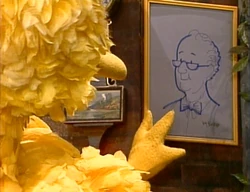 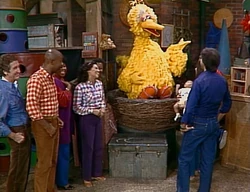 |
SCENE 6 | Big Bird hangs the drawing of Mr. Hooper by his nest when the grown-ups arrive for Mr. and Mrs. Williams to show Big Bird their new baby, Leandro. "Gee, you know what the nice thing is about new babies?" Big Bird asks the group. "Well, one day they're not here... and the next day, here they are!" Olivia announces the sponsors. |
Guest cast[7]
- Leandro Araujo as Leandro (baby)
- Helio Araujo as Leandro's father
- Liseia Araujo as Leandro's mother
Notes
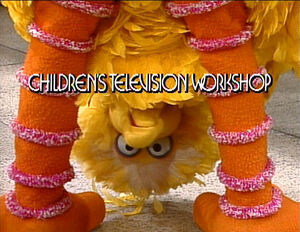
- All of Big Bird's drawings of his adult friends, including the famous Mr. Hooper picture, were drawn by Caroll Spinney, Big Bird's performer and a cartoonist in his own right.
- The staff considered, but ultimately rejected, the use of flashbacks with Mr. Hooper, citing that it would confuse children because, "for them, if something moves, it's alive."[5] Later, Episode 2073, which aired the next season, featured a montage of freeze frames of Mr. Hooper. Conversely, in Episode 3611, aired in 1997, video flashbacks of Mr. Hooper are used when Big Bird reminisces about him.
- Researchers instructed the staff to not reference Mr. Hooper "going to the hospital," for fear that a child might worry if a loved one gets sick and goes to a hospital.[8] They were similarly instructed not to say he died of sickness or due to old age.[9]
- Several episodes made posthumous mentions of Mr. Hooper.
- Spinney admitted in 1984 that he was hesitant about Stiles writing the script. "Anyway, I was initially apprehensive because the writer who was assigned to this script is a very funny writer, a real yuk-yuk writer, but I was absolutely delighted with the depth and the warmth that he got into it."[10]
See also
Sources
- ↑ 1.0 1.1 1.2 Death of a Character is a Sesame Street Topic, The Associated Press. August 31, 1983.
- ↑ Caroll Spinney Interview on NPR Morning Edition, May 2003.
- ↑ 3.0 3.1 Loretta Long on The Tavis Smiley Show. November 9, 2004.
- ↑ "Q&A with Sesame Street's Bob McGrath", The Mercury News (San Jose), December 2006.
- ↑ 5.0 5.1 "Valeria Lovelace", ECU Magazine, Winter 86/87, Vol 1, No. 1
- ↑ "Man behind Big Bird, Oscar is nostalgic for early days of Sesame Street", The Mercury News (San Francisco), October 26, 2006.
- ↑ Script for Episode 1927, with same family
- ↑ Norman Stiles interview, video interview for the Archive of American Television, conducted on December 12, 2014.
- ↑ Sesame Street: A Celebration - 40 Years of Life on the Street, page 182
- ↑ "Big Bird wings in with just one grouch: Oscar", The Age, 15 March 1984, page 40.
| Previous episode: | Next episode: |
| Episode 1838 | Episode 1840 |